Court Marriage in Karachi: Procedure of Court Marriage in Pakistan
Court Marriage in Pakistan: A Guide to Eligibility Criteria for Court Marriage
Court Marriage in Pakistan is available to individuals who meet certain eligibility requirements. To qualify, both parties must be of legal age, currently unmarried, and have the mental capacity to make informed decisions. Residency requirements may also apply, and in some cases, parental or guardian consent might be necessary. It is important for couples to thoroughly understand these criteria to ensure a smooth and lawful court marriage process. Being well-informed about these requirements helps couples navigate the legal aspects of their union effectively and avoid any potential complications.
Step-by-Step Procedure of Court Marriage in Pakistan
The Court Marriage process involves a sequential approach. Here is the step-by-step process of court marriage in Pakistan:
Contact our dedicated court marriage lawyers to schedule the Nikah ceremony and affidavit signing.
Our lawyer ensures that at least two adult Muslim male witnesses are present, as per Hanafi law.
The couple attends the Nikah ceremony at our office or any agreed-upon location.
After the bride signs the affidavit of her free consent, the Nikah is solemnized by a Nikah Khawan/Qazi or the Nikah Registrar in the presence of two adult, sane Muslim witnesses.
Finally, the official Nikah Nama is registered, and two copies of the registered Nikah Nama are handed over to the bride and groom.
Legal Framework of Court Marriage in Pakistan
The legal underpinning of Court Marriage in Pakistan is derived from the Muslim Family Laws Ordinance of 1961. This legislation outlines the rights, obligations, and procedures related to marriage, including Court Marriage. Understanding this legal framework is essential for couples to navigate the process confidently and ensure their marital rights are protected.
Documentation Requirements for Court Marriage in Pakistan
Court Marriage necessitates specific documentation. Essential papers include the couple’s identification proofs, age certificates, and proof of residency. Additional documents might be required based on individual circumstances. Providing accurate and complete documentation is crucial for a smooth Court Marriage process.
Age Requirements for Court Marriage in Pakistan
The minimum age for Court Marriage in Pakistan is 18 for both men and women. This legal stipulation aligns with international standards and ensures that individuals are mature enough to make informed decisions about marriage. Any marriage below this age is considered illegal and void.
Witness Requirements for Court Marriage in Pakistan
Two adult witnesses are mandatory for a Court Marriage in Pakistan. These witnesses must be competent and able to attest to the marriage ceremony. Their presence is essential for validating the marriage contract and safeguarding the legal rights of the couple.
Role of Nikah Khawan for Court Marriage in Pakistan
In a court marriage in Pakistan, the Nikah Khawan (Qazi/Imam) plays a central role. He is responsible for solemnizing the Nikah in accordance with Islamic Sharia and ensuring that the bride and groom have given their consent freely. The Nikah Khawan conducts the Nikah ceremony in the presence of the required witnesses and records the proceedings.
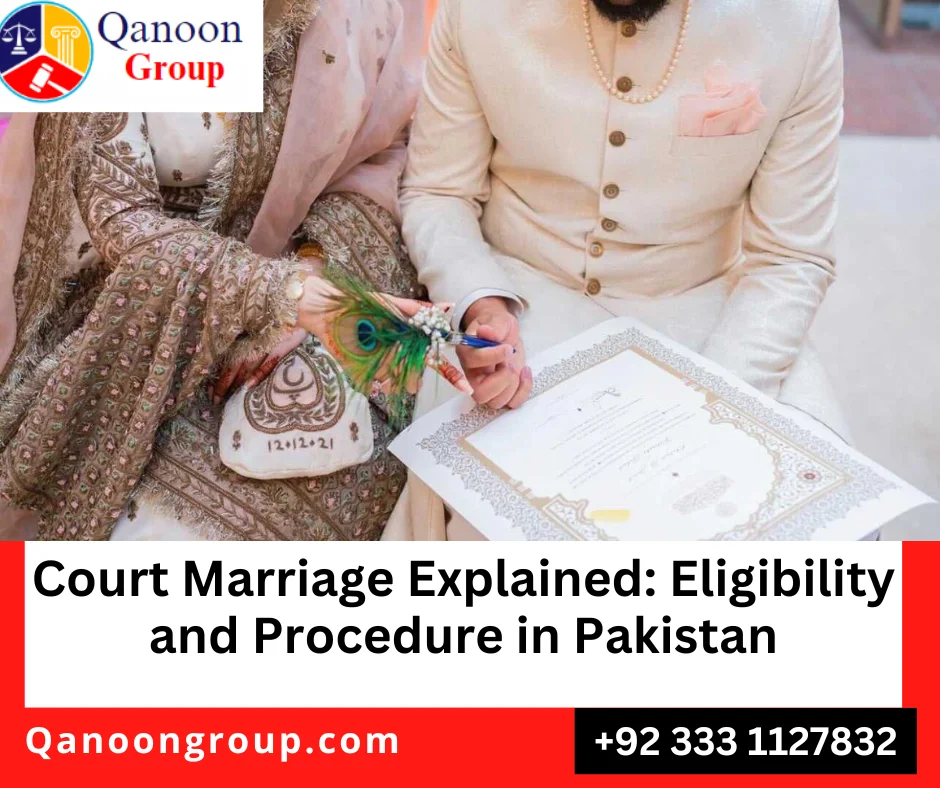
Affidavit Submission for Court Marriage in Pakistan
An affidavit is often required as part of the Court Marriage process. This sworn statement typically declares the couple’s eligibility, free consent to the marriage, and absence of any legal impediments. The affidavit serves as a legal affirmation of the couple’s intentions.
Importance of Nikahnama for Court Marriage in Pakistan
The Nikkahnama is the legal contract of marriage in Pakistan, including Court Marriages. It outlines the rights, obligations, and financial terms agreed upon by the couple. The Nikkahnama holds significant legal value, serving as evidence of the marriage and protecting the rights of both spouses.
Court Marriage: Role of Union Councils in Pakistan
In Pakistan, Union Councils do not directly perform or solemnize court marriages. Instead, their primary responsibility lies in maintaining official civil records of citizens. This includes registering births, deaths, marriages (including court marriages), and divorces within their jurisdiction.
Once a court marriage is solemnized by a Nikah Khawan and registered by the Nikah Registrar, the Union Council keeps a copy of the Nikah Nama along with the CNICs of the bride and groom for record-keeping purposes. It also issues the computerized marriage registration certificate, which serves as official proof of marriage for all legal, governmental, and administrative purposes.
Thus, the Union Council’s role in court marriage in Pakistan is primarily administrative and record-keeping, ensuring that marriages are properly documented, preserved, and legally recognized.
Registration Process of Court Marriage in Pakistan
After the Nikah Khawan solemnizes the Nikah ceremony (Qazi/Imam) in the presence of valid witnesses, the Nikah Registrar officially records the marriage in the government register. A copy of the Nikah Nama, along with the CNICs of the bride and groom, is then submitted to the Union Council (or the relevant local authority, such as the Cantonment Board in some areas). The Union Council preserves these records and subsequently issues the computerized Marriage Registration Certificate (MRC), which acts as the legally recognized proof of the union in Pakistan and abroad. Proper registration ensures that the marriage is valid under Pakistani family law and secures the couple’s legal rights, inheritance claims, and other entitlements.
Court Marriage Explained: Court Appearance and Hearing in Pakistan
In certain cases, a court appearance or hearing might be necessary for Court Marriage. This typically occurs when there are objections, disputes, or legal complexities involved. The court’s role is to resolve the matter and ensure the marriage proceeds lawfully.
Court Marriage Explained: Fees and Costs in Pakistan
Court Marriage involves specific fees payable to the government. These fees cover the registration process, issuance of certificates, and other administrative costs. Understanding the fee structure is essential for budgeting and financial planning.
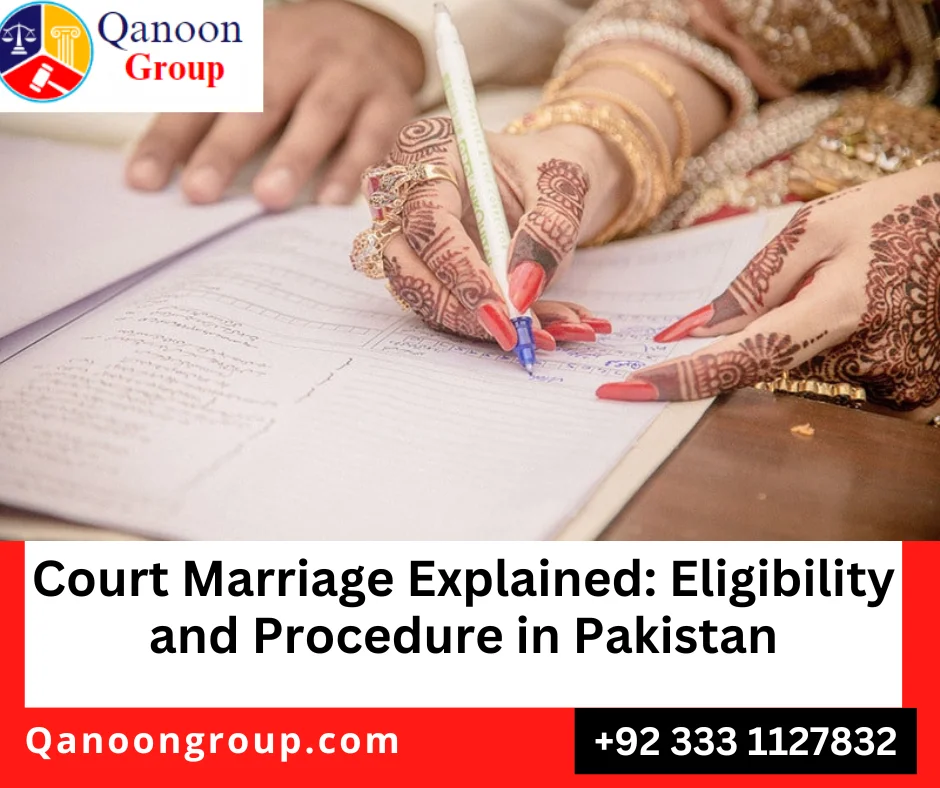
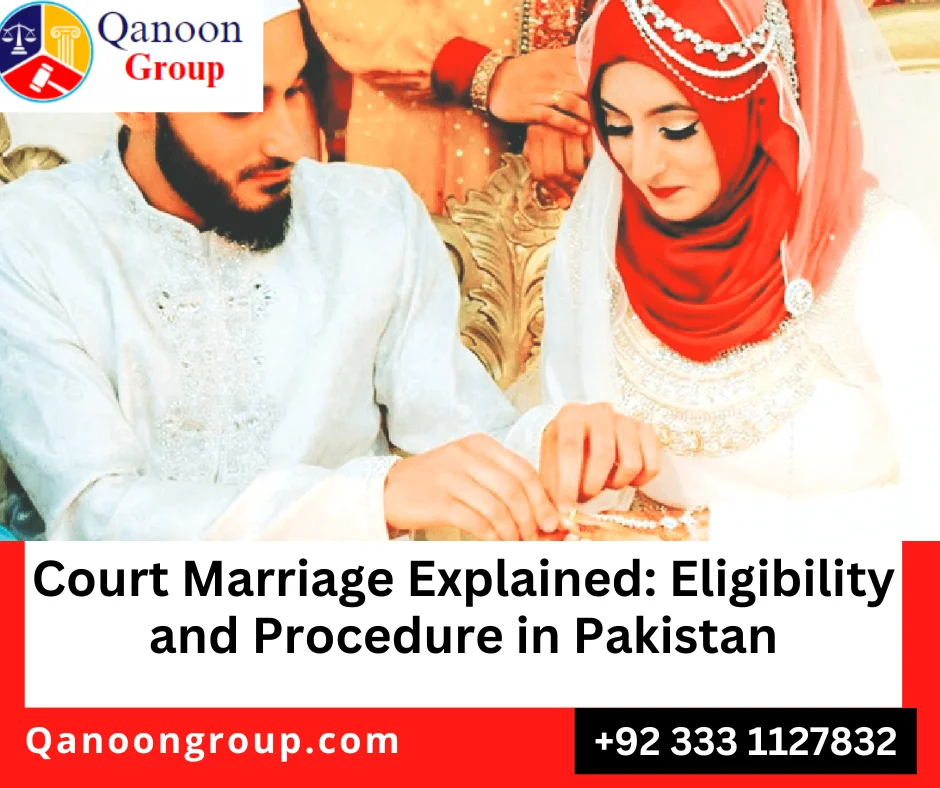
Legal Rights: Post-Registration Court Marriage in Pakistan
Upon successful registration, the married couple acquires legal rights and obligations. These include property rights, inheritance rights, guardianship of children, and maintenance. Understanding these rights is crucial for protecting the couple’s interests.
Court Marriage: Dealing with Objections in Pakistan
Objections to a Court Marriage can arise from various reasons. These might include disputes over eligibility, consent, or other legal grounds. The process of addressing objections involves legal procedures and can be complex. Seeking legal guidance is essential.
Importance of Legal Assistance for Court Marriage in Pakistan
Engaging legal counsel is highly recommended for a Court Marriage in Pakistan. Lawyers can provide expert guidance, ensure compliance with legal formalities, and protect the couple’s interests throughout the process. Legal assistance can prevent potential issues and complications.
Protecting Privacy and Confidentiality of Court Marriage in Pakistan
Privacy and confidentiality are crucial aspects of Court Marriage. The personal information provided during the process is protected by law. The marriage registrar and other officials are bound by confidentiality obligations to safeguard sensitive information.
Dealing with Religious Differences for Court Marriage in Pakistan
Court Marriage provides a legal framework accommodating diverse religious beliefs. While the core process remains consistent, specific rituals or customs may vary based on religious affiliations. Understanding and respecting these differences is essential for a harmonious union.
Court Marriage Explained: Common Misconceptions in Pakistan
Several misconceptions surround Court Marriage. Some believe it lacks religious sanctity or social acceptance. However, Court Marriage is a legally recognized form of marriage, offering equal rights and protections to couples.
Court Marriage Explained: Court Marriage vs. Traditional Marriage in Pakistan
Court Marriage differs from traditional marriage primarily in its legal and procedural aspects. While traditional marriages often involve elaborate ceremonies and family involvement, Court Marriage focuses on legal formalities and civil registration. The choice between the two depends on individual preferences and circumstances.
Court Marriage Explained: Benefits of Court Marriage in Pakistan
Court Marriage offers several advantages, including simplicity, speed, and legal clarity. It eliminates the complexities often associated with traditional marriages, provides a clear legal framework, and empowers couples to make independent decisions about their union.
Court Marriage Explained: Challenges and Solutions in Pakistan
Despite its benefits, Court Marriage faces challenges such as social stigma and legal complexities. Addressing these issues requires increased awareness, legal reforms, and support systems. Overcoming these hurdles will make Court Marriage a more accessible and accepted option.
Court Marriage Explained: Ensuring Legal Recognition in Pakistan
To ensure legal recognition, couples must adhere to the prescribed Court Marriage procedures. Obtaining a valid marriage certificate and registering the marriage are essential steps. Understanding the legal requirements and seeking professional guidance can help safeguard the marriage’s legality.

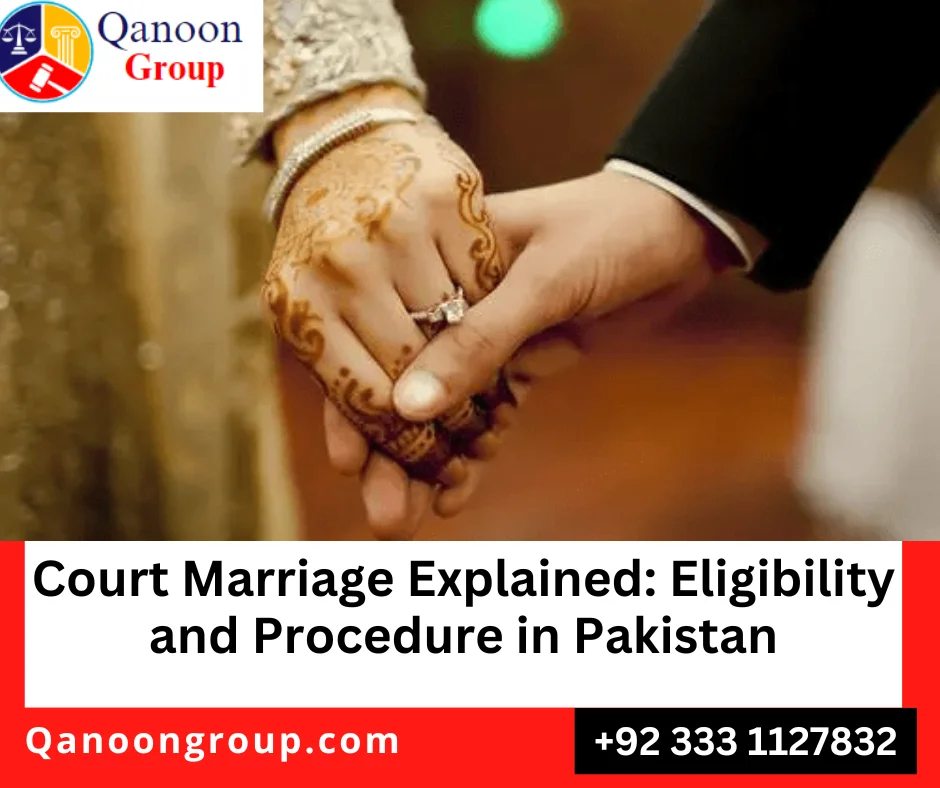
Court Marriage Explained: Post-Marriage Formalities in Pakistan
After the Court Marriage ceremony, certain formalities need to be completed. These may include registering the marriage, obtaining necessary documents, and informing relevant authorities. Completing these post-marriage formalities strengthens the legal standing of the union.
Court Marriage Explained: Resolving Family Opposition in Pakistan
Family opposition can be a significant challenge in Court Marriage. Open communication, seeking family counseling, and involving neutral mediators can help resolve conflicts. In extreme cases, legal intervention might be necessary to protect the couple’s rights.
Court Marriage Explained: Importance of Counseling and Guidance in Pakistan
Premarital counseling is beneficial for couples opting for Court Marriage. It helps address expectations, communication, and potential challenges. Post-marriage counseling can provide support and guidance in navigating the new marital life.
Legal Repercussions of Invalid Court Marriages in Pakistan
Marriages not conducted according to legal procedures are considered invalid. This can have severe legal consequences, including denial of rights, property disputes, and child custody issues. Understanding the legal implications of an invalid marriage is crucial to avoiding future complications.
The Impact of Media on the Acceptance of Court Marriage
Moreover, the portrayal of court marriages in media and popular culture has helped demystify the process, making it more acceptable. Today, it is not uncommon to see televised dramas and films highlighting court marriages, thus normalizing the concept and reducing societal stigma.
Court Marriage: A Sign of Broader Changes in Pakistani Society
Overall, the trend of court marriages in Pakistan reflects a broader societal shift towards embracing modern values and recognizing individual autonomy. As these trends continue to evolve, likely that the acceptance and prevalence of court marriages will only grow stronger.
Requirements for Court Marriage in Pakistan
Embarking on a court marriage in Pakistan requires adherence to specific legal and procedural preconditions. Ensuring that all the requirements are met not only guarantees the legality of the union but also fortifies the couple’s rights under Pakistani law. The first prerequisite for a court marriage in Pakistan is that both parties must be of legal age. According to Pakistani law, the legal age for marriage is 18 years for women and 18 years for men. This is an essential criterion that must be fulfilled without exception.
Court Marriage Documentation: CNICs, Passports, and Photographs
In addition to meeting the age requirements, certain documents are indispensable for the court marriage process. Both parties are required to present their Computerized National Identity Cards (CNIC) as proof of their identity and age. If one or both parties are non-Pakistani, valid passports serve as the equivalent documentation. Furthermore, recent passport-sized photographs of both individuals are needed. These photographs help in the official verification and documentation processes.
Affidavits and Proof of Previous Marriages: Essential for Court Marriage
Another significant requirement is the submission of affidavits from both parties. These affidavits must declare that they are marrying of their own free will without any coercion. This reinforces the element of consent in court marriage, which is imperative under Islamic law. For individuals who have been previously married, valid proof of divorce or the spouse’s death certificate must be provided to ensure no legal obstructions exist for entering into a new marriage contract.
Legal Age, Documentation, and Witnesses in Court Marriage
While the basics—legal age and necessary documentation—form the backbone of the court marriage requirements, there are additional criteria tailored to ensure the legitimacy and compliance of the marriage under Pakistani law. One such criterion is the presence of two adult Muslim witnesses, which is obligatory for the Nikah ceremony following Islamic traditions. These witnesses must also present their CNICs to authenticate their role in the marriage solemnization.
Court Marriage: Adhering to Legal and Governmental Requirements
It is prudent for prospective couples to thoroughly familiarize themselves with these requirements and ensure all documentation is accurate and up-to-date. Understanding and adhering to the legal stipulations not only smoothens the court marriage process but also upholds its recognition across various legal and governmental platforms in Pakistan, including Karachi, Lahore, Islamabad, Rawalpindi, Faisalabad, and Multan.
Straightforward Procedure of Court Marriage in Pakistan
Court marriage in Pakistan offers a straightforward and legal route for couples wishing to formalize their union. From obtaining the necessary documents to the final issuance of the marriage certificate, the procedure is designed to be comprehensive yet clear.
Initiating Court Marriage: Essential Document Preparation
To initiate a court marriage, the first step involves the preparation and collection of pertinent documents. Both parties need to possess valid national identity cards or passports. Additionally, domicile certificates and recent photographs are typically required. If either party is previously married, a divorce decree or death certificate of the former spouse is necessary.
The Role of a Lawyer in Court Marriage: Application and Nikah Nama
The next step is to hire a legal consultant or lawyer, experienced in court marriage procedures. The lawyer assists in the preparation of the marriage application and the drafting of the nikah nama (marriage contract). Both parties will then sign this document.
Navigating Court Marriage: Submission at Karachi, Lahore, Islamabad, Rawalpindi, Faisalabad, & Multan. and Other Cities
Following the documentation stage, the couple proceeds to the court. They will submit their marriage application to the relevant court, typically a Family Court or Senior Civil Judge Court in cities like Karachi, Lahore, Islamabad, Rawalpindi, Faisalabad, or Multan. Along with the application, supporting documents such as identification and proof of residence must be presented.
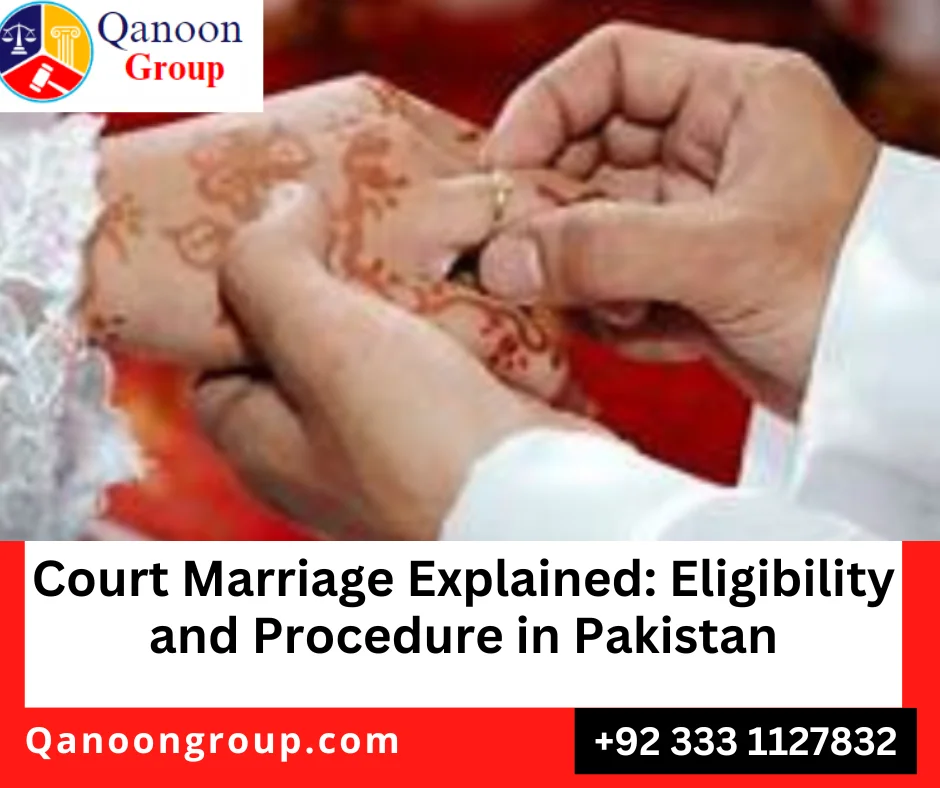
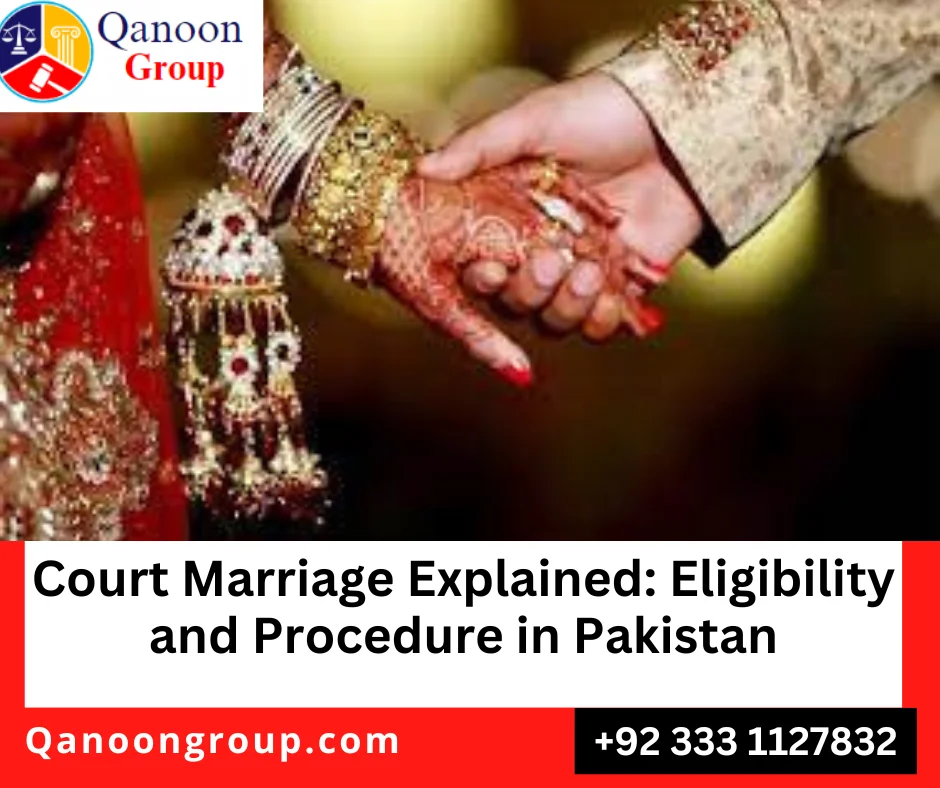
Court Marriage Hearing: Confirming Free Will and Legal Validity
Subsequently, the court schedules a hearing which both parties must attend. During this hearing, the court verifies the documents, ensures both parties are marrying of their own free will, and that there are no legal impediments to the marriage.
How to Secure Your Court Marriage Certificate and Legal Recognition?
Upon successful verification and consent from both parties, the court formally solemnizes the marriage and issues a marriage certificate. This certificate, often referred to as the nikah nama, serves as the official record of marriage. The couple is advised to register their marriage with the relevant union council to ensure its recognition in all legal and administrative matters.
Court Marriage Allowed in Islam?
The discussion around court marriages in Pakistan often circles back to the question of whether such unions align with Islamic principles. Islam delineates specific guidelines for marriage, known as “Nikah,” which emphasize the mutual consent of both parties, the presence of witnesses, and the provision of “Mehr” (a mandatory gift from the groom to the bride). The broad structure centered on justice, mutual respect, and transparent commitments makes Islamic teachings quite accommodating to various forms of formalizing marriage, including court marriages.
Islamic Scholars’ Views on Court Marriage in Pakistan
In Pakistan, many Islamic scholars have addressed the issue, often clarifying that a court marriage, when conducted under Islamic tenets, is indeed permissible. The focal point remains on ensuring that both parties consent freely and that the essential components of Nikah are fulfilled. Consequently, if these conditions are met, court marriage in cities like Karachi, Lahore, Islamabad, Rawalpindi, Faisalabad, or Multan, aligns well with Islamic law.
Court Marriage and Islamic Principles: Fulfilling Contractual Essentials
One of the pivotal stances in Islam is the sanctity of the marriage contract and the intention behind it. Islamic principles don’t necessarily mandate that marriages must be conducted within a religious facility; what remains critical is the fulfillment of the contractual and lawful essentials laid out by Islam. Thus, incorporating the legal framework of Pakistan’s judiciary system through a court marriage doesn’t contravene Islamic directives, provided the conditions of Nikah are observed and respected.
Legal Protections and Court Marriage: A Comparative Analysis
Court marriages can sometimes offer additional legal protection, which may not be as explicitly documented in more traditional settings. Given the urban dynamics in major cities and the rising trend of court marriages, Islamic scholars often emphasize the importance of ensuring that these arrangements adhere to the core principles of Islam. In essence, the compatibility of court marriages with Islamic law hinges on maintaining the integrity and obligations of the marital contract as prescribed in Islam.
Is Court Marriage Legal in Pakistan?
Court marriage in Pakistan is entirely legal and is governed by a specific set of laws designed to regulate the process. The primary legislative framework includes the Family Courts Act of 1964 and the Muslim Family Laws Ordinance of 1961. These statutes provide a comprehensive legal structure that allows individuals to solemnize their court marriage in a manner recognized by the state, religious authorities, and civil society.
The Role of Nikah Nama for Court Marriage in Pakistan
In Pakistan, court marriages typically adhere to Islamic principles, particularly the concept of nikah, which is a contract between the bride and groom. The Nikah Nama, or marriage contract, is a critical document that must be duly filled out and signed by both parties as well as by witnesses. This ensures that the marriage is legally binding and officially documented.
The Benefits of Court Marriage in Pakistan: Legal and Islamic Validity
One of the significant advantages of opting for a court marriage in Pakistan is the legal protection it assures. The marriage contract is not only valid in the eyes of Pakistani law but also holds legitimacy under Islamic law. This dual recognition fortifies the rights of both spouses, providing them with legal recourse in the event of disputes or complications. It is essential, however, to ensure all procedural requisites are met, including the consent of both parties and the presence of two adult Muslim witnesses.
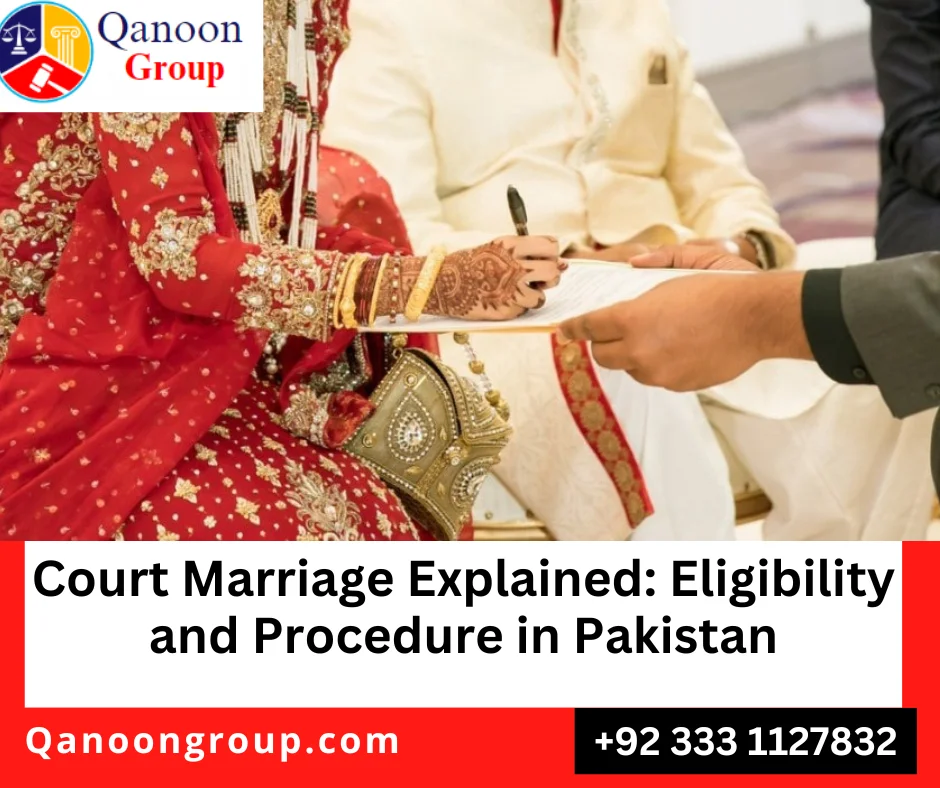
Geographical Variations in Court Marriage Procedures Across Pakistan
Geographical variations exist within the process based on the jurisdiction, whether it be in major cities like Karachi, Lahore, Islamabad, Rawalpindi, Faisalabad, and Multan. However, the core legal principles remain the same throughout Pakistan. The process typically involves filing necessary documents such as national identity cards, affidavits, and other related paperwork to the relevant family court.
Court Marriage Fees in Major Cities of Pakistan
Opting for a court marriage in Pakistan involves various fees that can fluctuate based on the city. Understanding the cost breakdown in major urban areas such as Karachi, Lahore, Islamabad, Rawalpindi, Faisalabad, and Multan is essential for planning.
Court Marriage Fees in Karachi
In Karachi, the financial capital of Pakistan, the average court marriage fees/cost range from PKR 20,000 to PKR 30,000. These charges typically encompass the legal documentation, administrative fees, and any miscellaneous expenses related to the ceremony.
Court Marriage Fees in Lahore
Transitioning to Lahore, Pakistan’s cultural heart, the court marriage fees are relatively similar, averaging between PKR 15,000 and PKR 25,000. The slight variation may be attributed to regional administrative costs and lawyer fees, which can slightly differ from those in Karachi.
Court Marriage Fees in Islamabad
For couples in Islamabad, the capital city, the court marriage costs usually range from PKR 15,000 to PKR 25,000. Due to the city’s administrative significance, fees can be marginally higher due to heightened bureaucratic procedures.
Meanwhile, in Rawalpindi, a city adjacent to Islamabad, the typical fee for a court marriage hovers around PKR 15,000 to PKR 20,000. This range is aligned closely with those in Lahore and Karachi, but may vary based on the specific legal services availed during the process.
In Faisalabad, known for its industrial economy, the fees for court marriage are moderately lower, ranging from PKR 20,000 to PKR 30,000. The primary expenses still include legal documentation and administrative charges.
Multan, a city famous for its historical and cultural heritage, has court marriage fees ranging between PKR 20,000 and PKR 25,000. The lower end of the spectrum often reflects reduced ancillary costs that may be higher in more bustling metropolitan centers.
